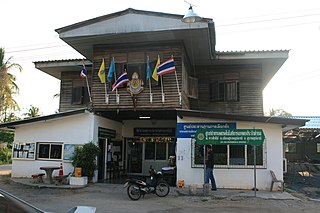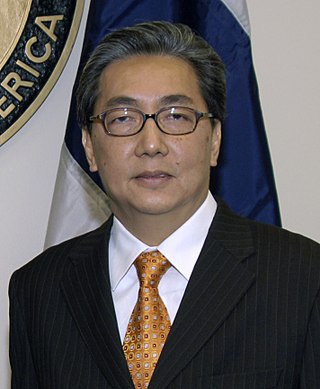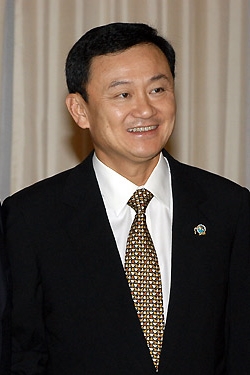Related Research Articles

The economy of Thailand is dependent on exports, which accounted in 2021 for about 58 per cent of the country's gross domestic product (GDP). Thailand itself is a newly industrialized country, with a GDP of 17.367 trillion baht (US$495 billion) in 2022, the 9th largest economy of Asia. As of 2018, Thailand has an average inflation of 1.06% and an account surplus of 7.5% of the country's GDP. Its currency, the Thai Baht, ranked as the tenth most frequently used world payment currency in 2017.

Thaksin Shinawatra is a Thai businessman and politician. He served in the Thai Police from 1973 to 1987, and was the Prime Minister of Thailand from 2001 to 2006.

Tambon is a local governmental unit in Thailand. Below district (amphoe) and province (changwat), they form the third administrative subdivision level. As of 2016 there were 7,255 tambons, not including the 180 khwaeng of Bangkok, which are set at the same administrative level, thus every district contains eight to ten tambon. Tambon is usually translated as "township" or "subdistrict" in English — the latter is the recommended translation, though also often used for king amphoe, the designation for a subdistrict acting as a branch of the parent district. Tambon are further subdivided into 69,307 villages (muban), about ten per tambon. Tambon within cities or towns are not subdivided into villages, but may have less formal communities called chumchon that may be formed into community associations.
Thaksinomics is a term used to refer to the economic set of policies of Thaksin Shinawatra, Prime Minister of Thailand from 2001 to 2006. There has been considerable controversy over the role Thaksinomics has played in Thailand's recovery from the 1997 Asian financial crisis. Among the most prominent advocates of Thaksin's economic policies is Morgan Stanley economist Daniel Lian.

Agriculture in Thailand is highly competitive, diversified and specialized and its exports are very successful internationally. Rice is the country's most important crop, with some 60 percent of Thailand's 13 million farmers growing it on almost half of Thailand's cultivated land. Thailand is a major exporter in the world rice market. Rice exports in 2014 amounted to 1.3 percent of GDP. Agricultural production as a whole accounts for an estimated 9–10.5 percent of Thai GDP. Forty percent of the population work in agriculture-related jobs. The farmland they work was valued at US$2,945/rai in 2013. Most Thai farmers own fewer than eight ha (50 rai) of land.

Somkid Jatusripitak is a Thai economist, business theorist, and politician.

Internal Security Operations Command or ISOC is the political arm of the Royal Thai Armed Forces. It was responsible for the suppression of leftist groups from the 1960s to the 1980s. During this period it was implicated in atrocities against activists and civilians. ISOC was implicated in a plot to assassinate Prime Minister Thaksin Shinawatra.

Mom Rajawongse Pridiyathorn Devakula is a Thai economist. He was the Governor of the Bank of Thailand from 2001 to 2006. Following the 2006 Thai coup d'état he served as minister of finance and deputy prime minister in the interim civilian government led by Prime Minister Surayud Chulanont. Following the 2014 Thai coup d'état he was appointed as a deputy prime minister in the first military appointed cabinet under General Prayut Chan-o-cha. Two days earlier he had resigned from his position as chairman of the board of Post Publishing PLC, the publisher of the Bangkok Post, Thailand's leading English-language newspaper.

Surayud Chulanont is a Thai politician. He was the Prime Minister of Thailand and head of Thailand's interim government between 2006 and 2008. He is a former supreme commander of the Royal Thai Army and is currently Privy Councilor to King Vajiralongkorn.
Prommin Lertsuridej, M.D. was a Thai politician, former student leader, former Secretary General to Prime Minister Thaksin Shinawatra, former Deputy Prime Minister in charge of economic affairs, and former Minister of Energy in the Thaksin government. After a 2006 military coup overthrew the Thaksin government, Prommin was arrested and detained by the junta for three weeks. He was released from captivity on 1 October 2006. Prommin is married to Mattaya Lertsuridej, M.D. and has 2 children and 2 grandchildren.

Thaksin University (TSU.), is a public university in Southern Thailand. It is located in Muang Songkhla District, Songkhla Province. It is about twenty kilometers from Hat Yai District. Previously, Thaksin University was a branch campus of Srinakharinwirot University. Afterwards it grew in size and eventually became a separate university. Thaksin University was established as an independent public university on September 1, 1996.

Chiang Saen is a district (amphoe) in the northern part of Chiang Rai province, northern Thailand. Chiang Saen is an important entrepôt for Thailand's trade with other countries on the upper part of Mekong River.
The domestic policy of Surayud Chulanont as Prime Minister of Thailand affected the Thai economy, human rights, education, and numerous other areas. Appointed Prime Minister by a military junta that overthrew the government of Thaksin Shinawatra, he has been praised for his efforts to reverse the policies of the Thaksin government and to reduce the role of foreigners in the Thai economy. However, his policies have been controversial, and he been accused of economic mismanagement, rampant human rights abuses, and allowing the escalation of the South Thailand insurgency.

One Town, One Product (OTOP) is a promotional program of the government of the Philippines. The initiative follows a similar undertaking by the Republic of China, which launched a One Town One Product in 1989 to promote companies in Taiwan. OTOP in the Philippines aims to promote goods and products of Filipino towns, cities, and regions, and provides funding for small businesses. It is administered by the Department of Budget and Management (DBM).

Thaksin Shinawatra was the 23rd prime minister of Thailand.

The Ministry of Interior of the Kingdom of Thailand is a cabinet-level department in the Government of Thailand. The ministry has wide ranging responsibilities. It is responsible for local administration, internal security, citizenship, disaster management, road safety, land management, issuance of national identity cards, and public works. The ministry is responsible for appointing the 76 governors of the Provinces of Thailand. The Minister of Interior is the head of the ministry. He is appointed by the King of Thailand on the recommendation of the prime minister. Since 1 September 2023, the head of the ministry has been Anutin Charnvirakul. He is aided by two deputy ministers. The FY2019 budget of the ministry is 371,802 million baht.
Responsible tourism is a relatively modern concept in the Kingdom of Thailand that took root in the late-1990s. It is underpinned by the belief that tourism should develop in a manner that minimizes negative impacts on local communities, and wherever possible ensure that a positive symbiosis exists between hosts and visitors. Responsible travel promotes a respect for indigenous culture, the minimization of the negative environmental impacts of tourism, active participation in volunteering to assist local communities, and the structuring of businesses to benefit the final service provider rather than an international agent.

Abhisit Vejjajiva was formally endorsed by King Bhumibol Adulyadej as Prime Minister of Thailand on 17 December 2008. Abhisit ascended to power amid a global economic crisis.
Thailand is a unitary state, which means the territories are separated into central co-dependencies, with the central government deciding everything for the provinces. The kingdom is separated into multiple levels including regions, provinces, and many more. Though, formally, Thailand is separated into three levels: provinces, districts, and sub-districts, there are also informal divisions such as parimonthon, and phak. Furthermore, there are administrative divisions of the same level with different names such as the first-level divisions of the province and the special administrative region.
References
- ↑ "What is OTOP?". Royal Thai Embassy Singapore. Retrieved 15 August 2017.
- ↑ Thaitrakulpanich, Asaree (14 August 2017). "DESIGNERS TAKE OTOP PRODUCTS FROM NOPE TO DOPE". Khaosod English. Retrieved 15 August 2017.
- ↑ Khongsawatkiat, Kittiphun (July–December 2002). "Isan Studies: 'One Tambon, One Product'; A Government Policy Recovers Farmers' Debts and Fragile Rural Sector in Northeastern of Thailand". Kasem Bundit. 3 (2).
- ↑ "About Us". Community Development Department (CDD). Ministry of Interior. Retrieved 15 August 2017.
- 1 2 Wancharoen, Supoj (15 May 2018). "Villages go all out to charm tourists". Bangkok Post. Retrieved 15 May 2018.
- ↑ Theparat, Chatrudee (6 February 2020). "State to upgrade over 20 Otop villages". Bangkok Post. Retrieved 6 February 2020.
- ↑ "OTOP 5 Star Products". OTOP5Star. Community Development Department. Retrieved 15 August 2017.